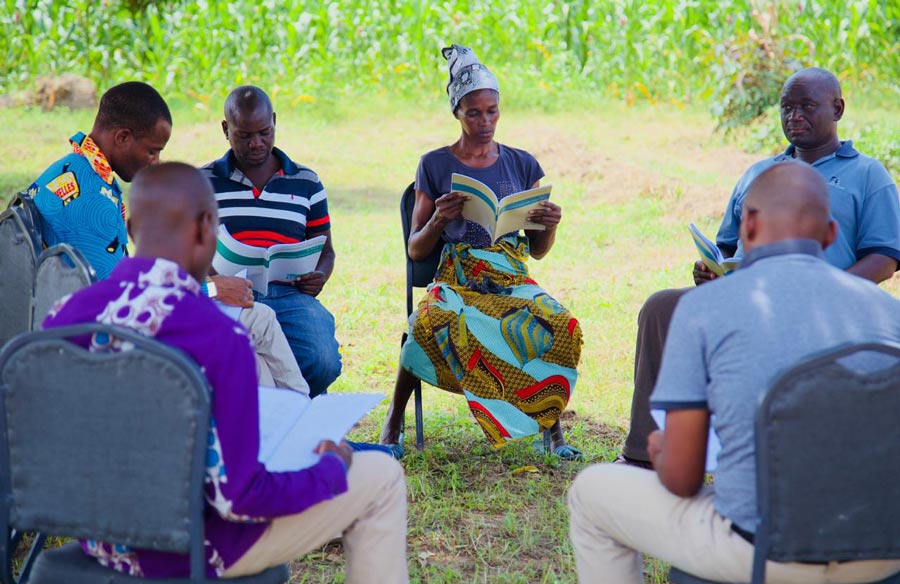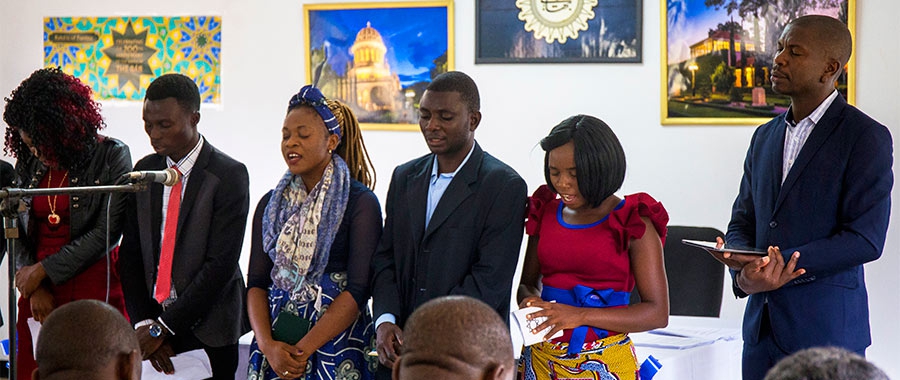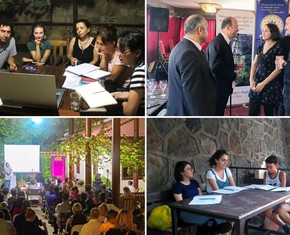Traditional chiefs and government officials attended two special ceremonies in recent weeks to dedicate new educational facilities—marking milestones in educational developments in Zambia.
More than 250 people attended the dedication of educational buildings in Mwinilunga on 22 February while another 130 attended the opening of a community agricultural center in Kabwe on 1 March.
At the heart of the process of social transformation under way in Zambia is a conviction that every population has the right and responsibility to mark out the path of its own progress. Education and training are viewed as means for unlocking people’s latent capacities for contributing to the development and progress of their communities and society at large.

A group of participants in one of Inshindo Foundation’s educational programs studies at the Ngungu Center for Community Agriculture.20
In Mwinilunga, in the country’s northwest, the new facilities will support a preschool, gatherings for women, educational programs, and youth gatherings for the region’s people, explained Kennedy Chanda, a member of the National Spiritual Assembly of Zambia.
“The official opening of these facilities in the presence of the chief, headmen, and government officials shows that they belong to the people,” Mr. Chanda added.
The opening of the new preschool and offices for Baha’i and Baha’i-inspired educational programs based in Mwinilunga comes amid a period of profound developments in the region. Since the Baha’i teachings were introduced to the Lunda people in 1962, many have identified with Baha’u’llah’s teachings and sought to apply them for the material and spiritual progress of their people.
“Development is meaningful when the local people develop capacity to take responsibility, and this institute focuses on capacity building,” District Commissioner Mwiya Thurani Ryan said at the opening ceremony.
Also addressing the audience, Senior Chief Kanongesha acknowledged the Baha’i community’s efforts to ensure the education of girls and promote equality in society, encouraging the Baha’is to do more.
The facilities are utilized by the Eric Manton Baha’i Institute, which has long provided vital educational programs and meeting spaces for the community. The first building was opened in October 1998 to provide space for educational activities organized by the Baha’i community, which had only a large meeting hall since 1968. The Institute is named after a Baha’i from the United Kingdom who moved to Zambia in 1952 to introduce the teachings of Baha’u’llah to people there.
About 500 kilometers to Mwinilunga’s southeast in Kabwe, the capital city of the country’s Central Province, another community gathered to witness the opening of the Ngungu Center for Community Agriculture. The community agriculture center in the city’s Ngungu township opened after a decade of work in the region by the Baha’i-inspired Inshindo Foundation.
“Inshindo Foundation believes that knowledge lies at the center of social progress,” the organization’s national coordinator, Mubanga Malitonga, said in a speech at the 1 March opening. “The Ngungu Center for Community Agriculture is meant to be a community-based center through which knowledge related to sustainable food production can be generated and shared among community members.”
The agricultural center will be staffed by local residents closely connected to the area’s food production systems. The staff will work with participants of Inshindo’s educational programs to learn about the application of sustainable systems of food production on small experimental plots of land. These insights will then be shared with local farmers who themselves are involved in the work of the agricultural center by contributing their own farming methods, Ms. Malitonga explained.

Provincial Minister Sydney Mushanga, also a member of parliament, attended the 1 March opening of the Ngungu Center for Community Agriculture.
The opening in Kabwe was attended by Provincial Minister Sydney Mushanga, who also addressed the attendees.
“This center holds great promise for further advancement of the learning processes at the grassroots in the area of sustainable food production. I am pleased that you have regarded it as a place where knowledge about agriculture will not only be shared to community members, but will also be generated,” said Mr. Mushanga, a member of parliament.
















Comments
Sign in or create an account
Continue with Googleor